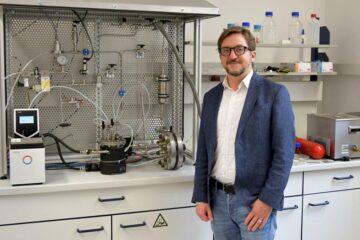Ultra-wet Gas Turbine

We offer a method to improve the passive scalar homogenization of mixing fluidic jets in cross flow configurations especially within the combustion chamber of a turbine. This is achieved by using fluidic oscillators that create an oscillating or pulsating fluid flow at the oscillator exit due to their way of construction. By this improved method high amounts of steam can be added to the combustion process and thus significantly increase the level of efficiency.<<br><br>The oscillation frequency of the injected fuel is thereby regulated only by the mass feed of the supplied fluid.<br>
The combination of cross flow injection and oscillation/pulsation of the fluid flow increases primarily the mixing ration of the two fluid flows within a combustion chamber (fluid & air) and moreover leads to a more effective burning. <br> The fluidic actuators can be installed within new (gas) turbines but can also be integrated in already existing ones.<br> <br> <strong>Benefits</strong><br> <ul> <li>Better temporal homogenization: NOx reduction, improved fuel value</li> <li>Pressure loss in turbine is reduced: enhancing performance rate</li> <li>Decrease of mixing length by ca. 50%: turbines could be build smaller</li> <li>Fluidic oscillators require less maintenance</li> <li>Usage of nearly any gaseous fuels</li> <li>Increased macro- and micromixing phenomena: higher gains in mixing quality</li> </ul> <strong>IP Rights</strong><br> PCT application filed<br> <br> <strong>Patent Owner</strong><br> Technische Universität Berlin</p>
Weitere Informationen: PDF
ipal GmbH
Tel.: +49 (0)30/2125-4820
Ansprechpartner
Dr. Dirk Dantz
Media Contact
Alle Nachrichten aus der Kategorie: Technologieangebote
Neueste Beiträge

Ideen für die Zukunft
TU Berlin präsentiert sich vom 22. bis 26. April 2024 mit neun Projekten auf der Hannover Messe 2024. Die HANNOVER MESSE gilt als die Weltleitmesse der Industrie. Ihr diesjähriger Schwerpunkt…

Peptide auf interstellarem Eis
Dass einfache Peptide auf kosmischen Staubkörnern entstehen können, wurde vom Forschungsteam um Dr. Serge Krasnokutski vom Astrophysikalischen Labor des Max-Planck-Instituts für Astronomie an der Universität Jena bereits gezeigt. Bisher ging…

Wasserstoff-Produktion in der heimischen Garage
Forschungsteam der Frankfurt UAS entwickelt Prototyp für Privathaushalte: Förderzusage vom Land Hessen für 2. Projektphase. Wasserstoff als Energieträger der Zukunft ist nicht frei verfügbar, sondern muss aufwendig hergestellt werden. Das…

















